#Code of Criminal Procedure
Text
Landmark Legislation: Parliament Passes Historic Criminal Law Bills for Overhauling Justice System
Landmark Legislation: Parliament Passes Historic Criminal Law Bills for Overhauling Justice System #CriminalLawReform #ParliamentLegislation #JusticeSystemOverhaul #LegalNews #BharatiyaNyayaSanhita #BharatiyaNagarikSurakshaSanhita #BharatiyaSakshyaSanhita
The Rajya Sabha passed three criminal law bills on Thursday, December 21, 2023, after the Lok Sabha had passed them on Wednesday. The bills are:
Bharatiya Nyaya (Second) Sanhita, which replaces the Indian Penal Code, 1860.
Bharatiya Nagarik Suraksha (Second) Sanhita, which replaces the Code of Criminal Procedure, 1898.
Bharatiya Sakshya (Second) Sanhita, which replaces the Indian Evidence Act,…

View On WordPress
#Bharatiya Nagarik Suraksha Sanhita#Bharatiya Nyaya Sanhita#Bharatiya Sakshya Sanhita#Code of Criminal Procedure#Constitutional Amendments#Criminal Law#Indian Evidence Act#Indian Penal Code#Justice Reform#Legislative Process#Parliament#Sedition#Terrorism
0 notes
Text
India's Legal Labyrinth: A Satirical Guide to Understanding BNS2, BNSS2, and BSB2
**Once Upon a Time in a Legal Wonderland:**In the grand democratic theatre of India, where laws are often more dramatic than Bollywood blockbusters, we’re witnessing the introduction of three legal musketeers: Bharatiya Nyaya (Second) Sanhita (BNS2), Bharatiya Nagrik Suraksha (Second) Sanhita (BNSS2), and Bharatiya Sakshya (Second) Bill (BSB2). They’re set to replace old legal classics – the IPC,…
View On WordPress
#2023#BNS2#BNSS2#BSB2#civil liberties#civil rights#Code of Criminal Procedure#constitutional law#democratic debate#freedom of speech#India legal reforms#Indian Evidence Act#Indian Parliament#Indian Penal Code#judicial system#Khalistan-movement#legal controversies#legal satire#legal updates 2023#Legal-Analysis#legislative process#National-Security#political humor#sedition law#treason in India#witty commentary
0 notes
Text
Human Rights of an Accused Person in India: Laws and Case Laws
In India, an accused person has certain human rights that are protected under the Constitution and various laws. Some of the key human rights of an accused person in India are:
Right to a fair trial: The Constitution of India guarantees the right to a fair trial to every person accused of a crime. This includes the right to be heard, the right to legal representation, and the right to a speedy…

View On WordPress
#Accused person#Bail#Case laws#Code of Criminal Procedure#constitution#Cross-examination#Cruel and degrading treatment#Double jeopardy#Fair trial#human rights#India#Judiciary#Legal representation#Right to remain silent#Self-incrimination#Speedy trial
1 note
·
View note
Text
SUPREME COURT DECIDES ON SEC. 120-B IPC CRIMINAL CONSPIRACY, CONFESSION OF COACCUSED UNACCEPTABLE,
SUPREME COURT DECIDES ON SEC. 120-B IPC CRIMINAL CONSPIRACY, CONFESSION OF COACCUSED UNACCEPTABLE,
Sec. 120-B IPC एक ऐसी कानूनी धारा है जो सब आरोपियों को डराती है। वह प्रेम असफलता के केस हों, रुपये पैसे के केस हो, मर्डर हो, चीटिंग हो, रेप हो कोई भी अपराध पुलिस ने दर्ज किया हो तो वह धड़ल्ले से Sec. 120-B IPC का इस्तेमाल करती है। दो आरोपी किसी भी अपराध में शामिल हों तो पुलिस साथ ही यह आरोप भी लगा देती है कि उन आरोपियों ने मर्डर करने से पहले मर्डर करने की साजिश की थी और उसके बाद अपराध को अंजाम…
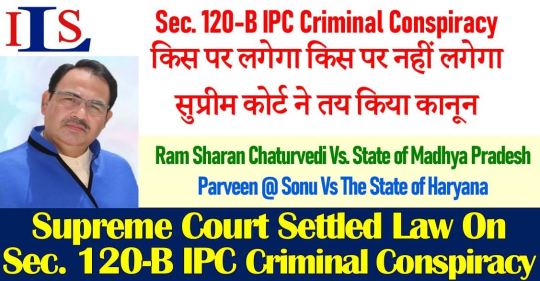
View On WordPress
#accused#Against False Allegation#Against false Cases#Circumstantial Evidence#Code Of Criminal Procedure#Confession#Court#Criminal Conspiracy#Cross Examination#Defence Counsel#Direct Evidence#Evidence Act#False Allegation#False Rape Allegation#False Rape Case#Indian Legal System#Indian Penal Code#Justice B.R. Gavai#Justice Hrishikesh Roy#Justice PS Narasimha#Justice R Subhash Reddy#Meeting of Minds#Onus of Proof#Parveen @ Sonu Vs The State of Haryana#Prosecutrix#Ram Sharan Chaturvedi Vs. State of Madhya Pradesh#Sec. 120-A IPC#Sec. 120-B IPC#State of Kerala v. P. Sugathan#Substantial Evidence
0 notes
Link
Chapter XII of CrPC deals with the provisions related to Investigation. Part II (sections 167-176) is discussed in detail with relevant cases.rights of arres...
0 notes
Text
Indian Laws Which Are Related To Drugs And Poisons
In Article 47 of the Indian Constitution, it is stated that the "State should endeavour to bring about prohibition of the consumption of intoxicating beverages and of narcotics which are harmful to health, except for therapeutic purposes." The same....
(more…)
View On WordPress
#Indian Laws Which Are Related To Drugs And Poisons#Small Quantity And Commercial Quantity Of Drugs Under NDPS Act 1985#The Criminal Procedure Code (CrPC) 1973#The Drugs Act 1940#The Drugs and Cosmetics Act 1940#The Drugs and Cosmetics Rules 1945#The Drugs and Magic Remedies Act 1954#The Drugs Control Act 1950#The Indian Evidence Act (IEA) 1872#The Indian Penal Code (IPC) 1860#The Narcotics Drugs and Psychotropic Substance Act 1985#The Pharmacy Act 1948#The Poison Act 1919
1 note
·
View note
Text
Understanding Bail: Types, Grounds and Legal Provisions
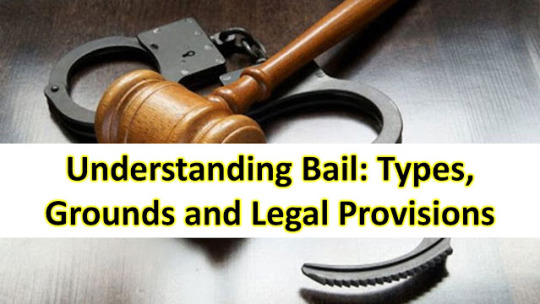
The Concept of Bail: Explained and Explored
Introduction
Bail is a well-established legal concept that has been in existence for a long time. The fundamental philosophy behind bail is to allow the accused to be released from the custody of law enforcement agencies and placed under the supervision of sureties. It serves as an interim order that can be revoked by the court at any stage, depending on the circumstances.Relevant Provisions: Understanding the Legal Framework
To better understand the concept of bail, it is essential to consider the relevant provisions within the Criminal Procedure Code (Cr.P.C.). In this regard, Sections 496, 497, and 498 of the Cr.P.C. play a significant role. Click Here to Read Full Article
#bail#bail procedure#crpc#bail procedure under criminal procedure code#Types of bail#legal provision for bail#bail in Pakistan#Basic Pakistani Laws in Urdu
0 notes
Text
For people that complain code blues on tv shows are over the top you need to watch Criminal Minds …that doctor and nurse did not care if that patient died right there they were not going to show any urgency at all they were just like 🧍♂️K. We’ll call a code blue when she’s already dead idc
#criminal minds#criminal minds rewatch#1.13#I need tags for this I’m going to make everyone read my thoughts they didn’t ask for#seriously tho they were like ‘defibrillator charging 🫥’ ‘nothing🫥’ like are you trying to save her life#and then they called a code blue AFTER ??? like maybe you should’ve done it before#so many people in this show just give NOTHING I’m so obsessed#it has got to be the most understated of procedurals#anyway this episode sucked I hated it and GIVE ME MORE ELLE
0 notes
Text
Ilya Yashin: See You Tomorrow in Court!
Ilya Yashin: See You Tomorrow in Court!
Ilya Yashin
Tomorrow, September 7, the court will consider the complaint filed by my lawyers in accordance with Article 125 of the Russian Federal Criminal Procedures Code. We demand that the decision to launch a criminal case itself be ruled unlawful due to the fact that there is no evidence that a crime was committed..
The hearing will take place at 2:00 p.m. in [Moscow’s] Basmanny District…
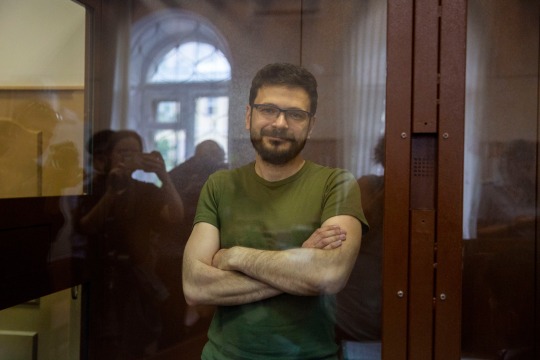
View On WordPress
#Basmanny District Court#discrediting the Russian Armed Forces#Ilya Yashin#Maria Eismont#Russian courts#Russian Criminal Procedures Code
0 notes
Text
The Best News of Last Week - September 11, 2023
Sorry for not sending last week's issue as I got covid again :/ I passed it, so here's the best things that happened last week :)
1. The IRS plans to crack down on 1,600 millionaires to collect millions of dollars in back taxes

The IRS announced on Friday it is launching an effort to aggressively pursue 1,600 millionaires and 75 large business partnerships that owe hundreds of millions of dollars in past due taxes. The newly announced tax collection effort will begin as soon as October. “We have more hiring to do,” Werfel said. “It’s going to be a very busy fall for us.”
2. The NGO African Parks announced it would purchase the world’s largest population of privately owned white rhinos

Africa’s beleaguered rhinos have been thrown a significant lifeline with the announcement that nearly 2,000 semi-wild rhinos owned by South African rhino breeder John Hume will be “rewilded” into reserves across South Africa and other parts of the continent over the next 10 years.
3. Mexico supreme court decriminalizes abortion across country
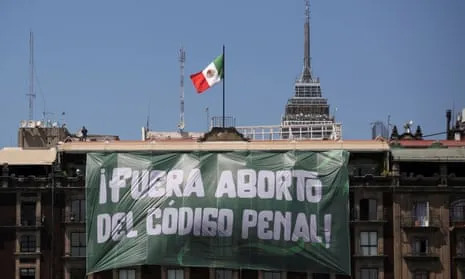
Mexico’s supreme court has unanimously ruled that state laws prohibiting abortion are unconstitutional and violate women’s rights, in the latest in a series of victories for reproductive rights activists across Latin America.
Wednesday’s ruling came two years after the court ordered the northern state of Coahuila to remove sanctions for abortion from its criminal code, a decision which prompted a tortuous state-by-state process of legal battles. So far 12 of Mexico’s 31 states have decriminalized the procedure.
4. The first human organ created inside an animal opens the door to manufacturing ‘spare parts’ for people

It is a historic image. A team of researchers in China has successfully generated a blueprint of a human organ in another animal for the first time. The experiment, conducted with humanized kidneys in pig embryos, represents a step toward the still-distant dream of using other mammals as source of organs for transplants.
5. Study Shows a Single Dose of Psilocybin's Astonishing Impact on Depression and Could Change Medical Treatments of Mental Health Forever

Psychedelics are making a comeback, and this time, they're dressed in the respectable garb of clinical research. Recent studies have reignited interest in these substances, particularly psilocybin, the active compound in magic mushrooms, as a potent treatment for major depressive disorder (MDD).
6. Missing cat reunited with owner after it disappeared during Alaska flooding

Twenty-six days after he went missing, an adorable black and white cat named Leo has been reunited with his family. Brave Leo went missing after historic glacial flooding swept away his home and all his owner's belongings.
7. Dogs perform Mozart with orchestra in Denmark
youtube
A classical music festival in Copenhagen, Denmark, has opened with some canine additions to the orchestra.
---
That's it for this week :)
This newsletter will always be free. If you liked this post you can support me with a small kofi donation here:
Buy me a coffee ❤️
Also don’t forget to reblog this post with your friends.
684 notes
·
View notes
Text
in most cases, as i've written before, what happens on campus is a matter for those on campus, not for the newspapers. but a few days ago, the new president of columbia, after a mccarthyite investigation by congress, during which she was questioned whether or not god damns columbia and stated that she is surveilling faculty, ordered the police to arrest students expressing their right to free speech; suspended a number of others, including ilhan omar's daughter, for which she received republican praise, barring them from their dorms and giving them only 15 minutes to collect their belongings before throwing them out; arrested legal observers at the encampment; and is now making it difficult for professors to access their offices and classrooms by requiring a police escort. this is an unconscionable attack on students doing nothing more than peacefully protesting the war in gaza and the university's financial investments in israel. there is no antisemitism, no harassment, no endangerment—save the endangerment from an unwarranted police presence and the kicking of 20 year olds out to the curb. it has since spiralled beyond campus, bringing together students, adjuncts, and academics from CUNY, NYU, and other city universities; similar encampments have popped up at universities across the country.
courtesy of a law professor:
Second, although President Shafik’s decision to invite the NYPD on campus to arrest students may have been within her formal authority, it breaks with an informal settlement that had been in place for more than a half-century. The last time the university called the cops on student protesters was April 1968;* that episode ended so bitterly and bloodily that it yielded a norm of police noninvolvement. Since 1968, student protesters have repeatedly occupied Low Library, blockaded Hamilton Hall, held sit-ins in administrative offices, waged hunger strikes, staged walkouts, and more. Some of these protests led to disciplinary code charges. None elicited a criminal law enforcement response. This week’s encampment on the South Lawn posed a difficult problem for the university administration, to be sure, but not one that was different in kind, duration, or disruptiveness from scores of post-1968 protests. When the next extended student demonstration occurs, it will be hard to resist pressure to call in the cops again.
Third, the most serious charge that President Shafik leveled against the student protesters, that their encampment created a “harassing and intimidating environment,” was made without the benefit of any factfinding process.** “Discriminatory harassment,” defined to include the creation of “an intimidating … environment,” is prohibited by Columbia’s Standards & Discipline policy. But that policy, and the procedural protections that come with it, does not seem to have been applied here. This suggests that the university deemed the protesters’ expressive conduct, as well as their occupation of the lawn, to be in violation of the Rules of University Conduct. Yet while the Rules allow the restriction of “expression that constitutes a genuine threat of harassment,” President Shafik offered no examples of such threats, nor to my knowledge have any been reported. If this finding of harassment is based on the discomfort some feel from the presence or message of the encampment, then the harassment concept—intended to set an objective standard that preserves a wide berth for provocative speech—has become an engine of viewpoint discrimination. Either way, its application to this case indicates that the president’s office now believes it can make such fraught judgments summarily and unilaterally.
Other examples of recent ruptures might be added to the list. In the jettisoning of these institutional norms, one throughline is the prioritization of immediate objectives over longer-term considerations of academic autonomy and democratic self-governance—considerations that the norms had developed, however imperfectly, to protect. In the university as in the wider world, crisis has thus led not only to rising repression but also to the consolidation of presidential power.
199 notes
·
View notes
Text
A Senate committee studying a bill to establish a criminal offence with respect to sterilization procedures heard emotional testimony from a survivor of coerced sterilization on Thursday.
"It's like you wiped out a generation," Nicole Rabbit, a member of Survivors Circle for Reproductive Justice, an organization for Indigenous women who are survivors of coerced and forced sterilization, told the committee in Ottawa.
Bill S-250 an Act to Amend the Criminal Code (sterilization procedures) would make forced and coerced sterilization punishable under the Criminal Code by up to 14 years in prison.
Full article
Tagging: @politicsofcanada
#cdnpoli#canada#canadian politics#canadian news#canadian#bill s-250#forced sterilization#coerced sterilization#sterilization#Indigenous#genocide#reproductive rights#reproductive health#reproductive justice#bodily autonomy#senate
210 notes
·
View notes
Text
What makes White Collar hold up so much better than other police procedurals:
It was part of the "pretty happy shows with gorgeous ensemble casts and a charismatic weird guy" USA network era but it somehow used that to be about stuff that is so REAL
What is justice? Is our system fair? Can you be a criminal and still be a good man? Can you be a good man and still work for the system?
The bad guys are rich assholes, and people defrauding families out of their homes, and unethical pharmaceutical companies. People manipulating energy supply out of greed resulting in blackouts which are showing *harming a dog,* aka how to show something is monstrous in a pg show written by a white person. Class exists in this universe in more ways than having a cardboard concept of a "rich guy."
The bad guys include police, FBI agents, prison staff, judges, senators. Those people cause real harm, obstruct justice, plant evidence, kill people. It's shown how the system protects them and harms regular people.
The harm that causes the main character to go from wanting to be part of the system, to subverting and working against it, is him finding out about an act of police corruption, brutality, and murder--and what's more, that if he became a cop, that's what he could become.
The harm that causes the main character to be outside the white picket fence is that the system failed his family after that act. What happened to Neal's mom? Why did nobody besides Helen step in? They had to check in with US Marshals, did nobody notice this kid didn't have an adult fit to parent?
So Neal turns to found family. And let's be real, heavily polyamory coded found family at that. But he keeps chasing the idea of a girl who will be everything. But he's got all this attachment trauma so he never does. But because found family is real family, even the people who freaking played the characters are still connected a decade later
#white collar tv show#white collar#neal caffrey#white collar usa#white collar (2009)#white collar meta#also like#not to mention the cast was relatively diverse#there was actual queer representation#and i see so many people coming back to it for comfort who loved it originally#it was fun exciting pretty crime show when I was 18#32 year old polyam person taking care of and being taken care of by found family#living in 2024#after living through 201620202023 that slide of years#it hits#uh#different
154 notes
·
View notes
Text
I have a Higuruma sfw crack head canon and I’m about to turn it into everybody’s problem

This has been written by an actual criminal defense attorney specialized in continental law (which is the system in place in Japan) with free time on her hands.
So, from what we’ve learned, Higuruma has dedicated his career exclusively to being a criminal defense attorney. Given he’s 35 during the events in JJK, it’s safe to say he has been working with it for at least a decade.
So, as it is to be expected, since he has been called a genius numerous times, his knowledge of criminal law and criminal procedure law is probably off the charts. That has also been demonstrated when he’s debating the possible outcomes to put Sukuna under trial during chapter 244 (also, chef’s kiss 🤌 for mentioning the statute of limitations and code amendments that came in 2010. Whoever consulted for Gege did a WONDERFUL job).

From what Higuruma has told us previously, Judgeman uses the six Japanese codes to give the sentencing: the Constitution, the Civil Code, the Criminal Code, the Commercial Code, the Code of Criminal Procedure, and the Code of Civil Procedure. I believe this might be a mistranslation, though, because the pachinko parlor prohibition seems to come from what we would call an ordinary bill, not one of the codes, but I digress.
Also, according to him, considering Judgeman is his shikigami, what he believes is feasible under interpreting a law becomes a possible verdict.
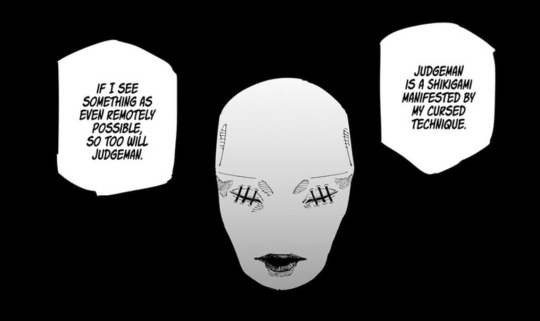
With all that, I need to settle some things of being a specialized attorney for a long time.
What happens, more often than not, is that you become incredibly rusty (and kinda bad) at comprehending and interpreting other areas of law. That happens simply because the rationale of each area works very differently. For instance, I don’t understand or remember most of what I studied regarding labor law during law school, and I’ve been working exclusively with criminal law (as an intern and then a lawyer) ever since 2015.
So here’s my question: if judgeman, for whatever reason, had to judge civil, labor or commercial matters, considering it is bound by Higuruma’s own comprehension of the Japanese laws, would it give bizarre verdicts that wouldn’t make ANY sense in an actual Japanese Court of law?
My head canon is that YES, THAT WOULD DEFINITELY HAPPEN, AND IT WOULD BE FUNNY AS HELL.
Anyway, that’s it, thanks for reading my brainrot. 🦉
#jjk#jujutsu kaisen#higuruma#Higuruma Hiromi#jjk higuruma#jjk hiromi#Hiromi jjk#jujutsu Higuruma#jujutsu Hiromi#jjk imagines#jjk headcanons#higuruma headcanons
133 notes
·
View notes
Link
Sections 190-210 discussed in detail. Chapter XVII of CrPC which deals with the provisions related to charge (Sections 211-224) also discussed in the same lecture. inquiry investigation investigation under crpc summary trial under crpc
0 notes